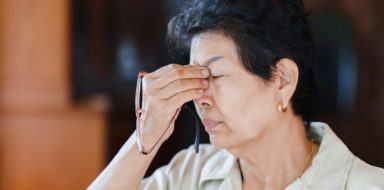Allergy Mask: Do Surgical Masks Help With Allergies?
Goldenrod is infamous for triggering seasonal allergies. But it's not the only bad actor – as trees, grass, and weeds can cause a pollen allergy as well.
Mowing the lawn, walking on a nature path, even traveling can be hazardous if you have allergies. In areas with a long growing season (California and Georgia, for example), you can find yourself immersed in high levels of pollen in the air, which then produce symptoms. Trees typically pollinate in the spring, and weeds in the fall can cause significant problems.
While not everyone's favorite fashion accessory, surgical masks allow you to be less exposed to allergens and reduces the amount which finds its way into your airways.
For example, if you have mold allergies and you need to clean the mold up, you should be wearing a surgical mask or if you have pet allergies and you need to give the family dog a bath, you should be wearing a surgical mask. In any case when you know that you will need to be exposed to airborne common allergens, and you have the opportunity to be proactive before the event, the use of a surgical medical mask can be an option.
A face mask is a very effective way to cut your exposure to a multitude of offenders (allergens) including pollen, dust, soot, chemicals, mold, and even bacteria or viruses. In addition, wearing a surgical mask is a good way to prevent you from touching your nose or eyes with your hands. This keeps both allergens and germs away from your respiratory tract while you are wearing the surgical mask.
You should consider wearing an allergy mask if you:
- Have dust, mold, or pollen allergies.
- Sensitive to airborne allergens.
- React to allergens while doing household chores and/or yard work.
- Have trouble breathing when pollution levels are high.
- Have breathing problems related to allergies or asthma.
- Concerned with H1N1, the Avian Flu, enterovirus, or other types of flu viruses or bacteria.
Buying an Allergy Mask
When you start to research allergy masks, you will see that they have NIOSH ratings.
Two agencies – the National Institute for Occupational Safety and Health (NIOSH) Personal Protective Technology (PPT) Program – have a mission is to prevent work-related injury, illness, and death related to exposures.
The PPT Program tests respirators (face masks) before they enter the market – which results in NIOSH-approved respirators that meet the minimum construction, performance, and respiratory protection standards to keep users safe.
Sneezing is a universal reaction, something everyone will experience — especially during allergy season. But why do we sneeze?
The "N" and "R" classifications indicate they are not resistant to oil or oil-based particles, which doesn't apply to the common allergens. However, the NIOSH number classification are important for allergy sufferers.
All NIOSH masks and respirators are rated N95 or better. The "95" means that 95 percent of the "most penetrating" particles (generally, .03 microns or greater in size) are effectively captured and filtered by these masks. A "100" rating would mean that 99.7 percent of these size particles are effectively filtered. This is also considered HEPA filtration or HEPA equivalent.
For most people, an N95 respirator will effectively filter harmful particles that could cause allergic or asthmatic reactions.
No NIOSH rating?
If a mask does not have a NIOSH rating, it likely was manufactured in the UK. These masks must meet similar European filtration standards. The European Standard EN149 FFP1 is the rough U.S. equivalent of the N95 NIOSH rating.
Also, some masks are not considered respirators but do offer protection against particles. These can be effective for every day or household uses, as they effectively block particles and allergens.
When it's worn properly, a face mask or respirator can be your best friend. All of the masks and respirators provide a physical barrier between you and allergens, and the best respirators actually filter submicron particles such as pollen, air pollutants (benzene), as well as bacteria or flu virus.
If you're concerned about raking leaves, pollution or soot, there's a mask available for your specific needs.
Consider this, however: If your allergy requires wearing a mask 24 hours a day (as during pollen season), maybe it's best to get treated for seasonal allergies. You can save the mask for times when you've got to go outside.
In addition, keep windows closed at home and in the car during pollen seasons. If someone has a big exposure to pollen, he or she may want to remove clothes when they come in and take a bath or a shower.
We think that grass pollen levels tend to be highest in the late afternoon and early evening. So it may be best for allergic individuals to avoid outdoor activities during those times.
Talk to your physician to help you determine which direction is best – wearing a mask (and what level of filtration do you need) and/or getting treated for your allergies.







